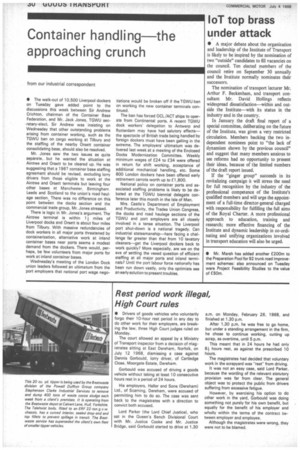Container handling the approaching crunch
Page 32

If you've noticed an error in this article please click here to report it so we can fix it.
from our industrial correspondent
• The walk-out of 10,500 Liverpool dockers on Tuesday gave added point to the discussions this week between Sir Andrew Crichton, chairman of the Container Base Federation, and Mr. Jack Jones, TGWU sec • retary-elect. Sir Andrew was insisting on Wednesday that other outstanding problems arising from container working, such as the TGWU ban on cargo working at Tilbury and the staffing of the nearby Orsett container consolidating base, should also be resolved.
Mr. Jones saw the two issues as quite separate, but he wanted the situation at Aintree and Orsett to be cleared up. He was suggesting that a 1967 container base staffing agreement should be revised, excluding lorry drivers from those eligible to work at the Aintree and Orsett terminals but leaving four other bases at Manchester, Birmingham. Leeds and Scotland to the union's road haulage section. There was no difference on this point between the docks section and the commercial trade group, Mr. Jones stressed.
There is logic in Mr. Jones's argument. The Aintree terminal is within lf miles of Liverpool docks and Orsett is about four miles from Tilbury. With massive redundancies of dock workers in all major ports threatened by containerization, alternative work at inland container bases near ports seems a modest demand from the dockers. There would, perhaps, be few volunteers from major ports for work at inland container bases.
Wednesday's meeting of the London Dock union leaders followed an ultimatum from the port employers that national port wage nego
tiations would be broken off if the TGWU ban on working the new container terminals continued.
The ban has forced OCL/ACT ships to operate from Continental ports. A recent TGWU dock workers' delegation to Antwerp and Rotterdam may have had salutory effects— the spectacle of British trade being handled by foreign dockers must have been galling in the extreme. The employers' ultimatum was delivered last week at a meeting of the Enclosed Docks Modernization Committee. Weekly minimum wages of £24 to £34 were offered in return for shift working, acceptance of additional mechanical handling, etc. Some 800 London dockers have been offered early retirement carrots worth up to £1,800.
National policy on container ports and associated staffing problems is likely to be debated at the TGWU biennial delegate conference later this month in the Isle of Man.
Mrs, Castle's Department of Employment and Productivity, the Trades Union Congress, the docks and road haulage sections of the TGWU and port employers are all closely involved in a tense situation. The Liverpool port shut-down is a national tragedy. Can industrial statesmanship—here facing a challenge far greater than that from 10 lavatory cleaners—get the Liverpool dockers back to work quickly? More especially, are we on the eve of settling the vexed question of efficient staffing at all major ports and inland terminals? Until the port labour force nationally has been run down vastly, only the optimists see an early solution to present troubles.




























































































































































